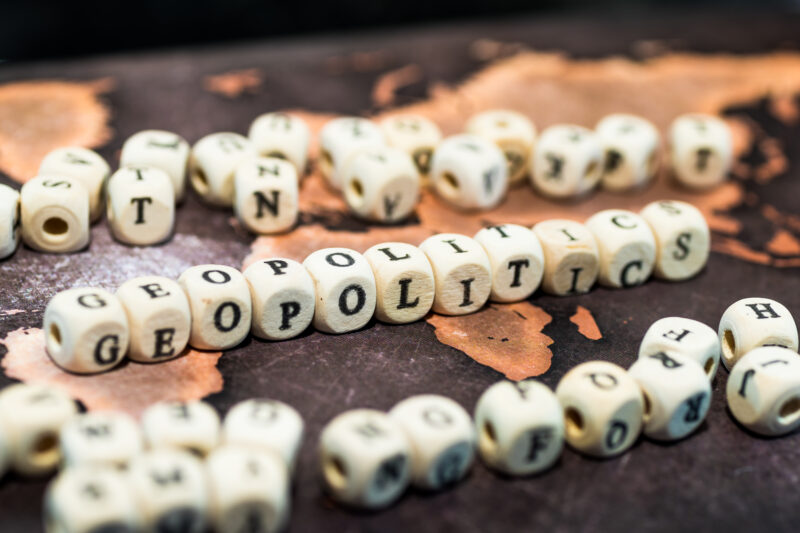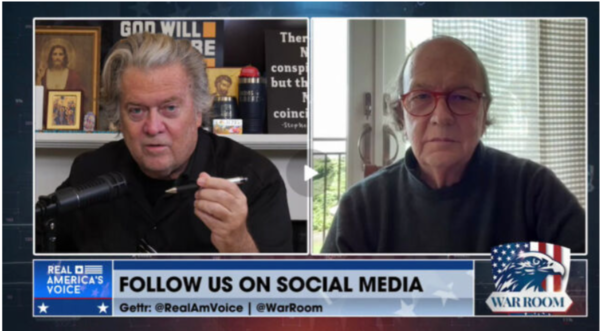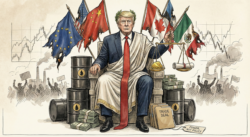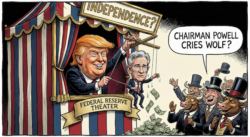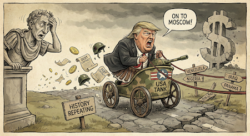Editor’s note: Nick Hubble here. This comes from Jim Rickards’ team in the U.S. He asked us to pass it along because what’s unfolding between Trump and Saudi Arabia could reshape global capital flows—and open the door to rare opportunities for UK investors who know where to look.
Let’s get into it…
Our friend and colleague Jim Rickards was on Steve Bannon’s War Room show Tuesday, and it may be the most important interview Jim has done this year.
In this fascinating discussion, Jim starts with the history of the original petrodollar system. And he knows the subject well, having helped create it.
The premise of the 1974 petrodollar agreement was that Saudi Arabia would only sell oil in dollars, which would stimulate demand for greenbacks as a reserve currency. Here’s Jim explaining the basics to Steve Bannon’s audience:
“We had a carrot and stick approach. Bill Simon, who was Secretary of the Treasury, went to the Saudis and said ‘everybody in the world needs oil, and if you price oil in dollars, then everybody needs dollars.’
And that basically underpins the role of the dollar today as the world’s reserve currency.
The stick was, if you don’t do it we’re going to invade Saudi Arabia and take over oil production.
The carrot was, if you price oil in dollars, we’ll give you a security umbrella.
It’s rare to hear such candor coming from someone who was directly involved in the formation of the petrodollar system.
Needless to say, the petrodollar system was successful and led to a resurgence in the American dollar as the world’s key reserve currency (despite Nixon ditching the gold standard just 3 years earlier).
At this point, Steve Bannon interrupted with an insightful question (paraphrased):
“Wait, you say the petrodollar system is still in place, but the Saudis are now selling oil to China for yuan. Aren’t cracks showing in the petrodollar system?”
Jim responded that yes, cracks are starting to show in the system, and that’s why Trump was in Saudi Arabia, to seal a “Petrodollar 2.0” agreement. Jim also points out that, at least for now, the amount of oil Saudi Arabia is selling for yuan and other currencies is miniscule compared to dollar-based sales.
Jim proceeds to lay out the purpose of Petrodollar 2.0:
“The U.S., by strengthening its relationship with Saudi Arabia, and creating Petrodollar 2.0, puts the pressure on China to reduce their tariffs and meet Trump’s requirements. Otherwise they don’t have a source of dollars.”
This time around, Trump is using a strictly carrot-based approach. He’s on a charm offensive and looking to build strong, lasting ties with Saudi Arabia and the broader Middle East. This is a smart approach and we expect it will bear fruit in the near future.
Had President Trump taken a threatening approach to Saudi Arabia, it almost certainly would have driven the country into China’s waiting arms. And America can’t afford to let that happen.
What This Means for UK Investors
- Dollar Strength and FX Exposure
If a new Petrodollar 2.0 deal boosts global demand for the U.S. dollar, expect a stronger greenback. For UK investors, this means potential headwinds for GBP/USD and an advantage for holding dollar-denominated assets.
- Oil Market Stability (and Volatility)
UK energy giants like BP and Shell price oil globally. A reinforced dollar-based oil system would offer short-term price stability, but also raise longer-term geopolitical risks as China and Russia push back with alternative trade blocs (like BRICS+). UK investors with energy exposure need to monitor this closely. - Gold as a Strategic Hedge
Rickards has long warned of potential cracks in the global monetary system. If Petrodollar 2.0 falters—or sparks greater fragmentation—gold may surge as a hedge. UK portfolios may benefit from increasing allocation to gold or commodity-linked assets. - Middle East and Emerging Market Risk
UK funds exposed to Middle Eastern sovereign wealth flows, infrastructure, or joint ventures should track how this shift affects regional capital flows. A U.S.-Saudi alignment may reduce volatility, for now, but raises the stakes if global powers start competing for energy alliances. - The Bigger Picture: A Global Reset?
Rickards hints that this could be a first move in a broader reordering of global finance. For UK investors—especially those in macro, FX, and commodities—it’s not just about oil. It’s about who controls the rules of trade, reserves, and capital flow over the next decade.
It’s an excellent interview, and you can watch the entire thing here (free) on Rumble. Jim also gets into Russia vs. Ukraine with Steve, and brings an insightful and unique perspective as always.
Also, be sure to follow Jim’s new account on X (formerly Twitter)!

Nick Hubble
Contributing Editor, Investor’s Daily
P.S. You may have just seen Jim Rickards’ latest interview on Trump’s Saudi charm offensive and the return of the petrodollar. But there’s a bigger picture emerging here. From mineral independence to energy diplomacy, Trump’s second-term strategy isn’t just about America—it’s about reshaping the global order. For British investors, that could mean new cracks in the dollar system… or the start of a monetary reset where real assets like gold and energy dominate. Either way, now’s the time to position for what comes next.
What you may have missed…
The Collapse of Communist China
Behind the façade of growth, China’s foundations are crumbling. Web excerpt: China was once seen as an unstoppable superpower. But beneath the surface, its economy is cracking, its population is shrinking, and unrest is rising. Jim Rickards lays out why the collapse of the Chinese Communist Party may be closer than anyone thinks—and what it could mean for global markets. Read more here…
Trump’s ‘Nuclear’ Deportation Options
Trump’s immigration crackdown is facing its fiercest resistance yet—not from migrants or politicians, but from activist lawyers and rogue judges determined to grind his agenda to a halt. For UK investors exposed to U.S. markets, this legal showdown could shape everything from trade to growth. Here’s what’s at stake—and how it could end. Read more here…
First they ignore you, then laugh at you, then add you to the S&P 500
Coinbase just joined the S&P 500—making crypto officially unavoidable for every investor in an index ETF. Today, I break down why this milestone matters, how passive capital is being funneled into digital assets, and why we may be on the verge of a “Crypto Summer” no one’s ready for. Read more here…
I Was Wrong About Gold (and Bitcoin)
For years, I called gold a shiny rock—and backed Bitcoin instead. But now, someone’s putting physical gold directly onto the Bitcoin blockchain. This isn’t just clever. It’s the start of a much bigger wave: tokenizing the $1.4 quadrillion global asset stack. From gold to real estate to stocks, everything is about to go on-chain. Here’s what happens next—and how to get ahead of it. Read more here…
From Oil to Algorithms: Trump invokes the spectre of Roosevelt
Eighty years ago, Roosevelt secured America’s oil future with a secret handshake in the Middle East. Now, I believe Trump is trying to do the same—with AI. In this piece, I break down what I saw behind the headlines of his latest trip, why compute is the new crude, and what this shift could mean for UK investors like you. Read more here…
